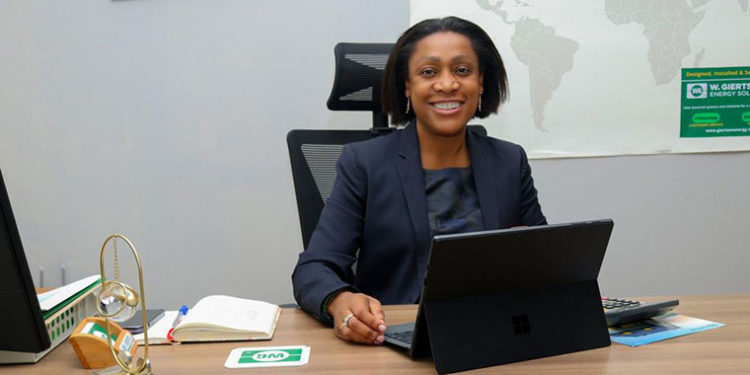By THE OBSERVER UG
DEBORAH KISAKYE SSEMPASA, a renewable energy expert, is overseeing the installation of solar energy systems in East Africa for W.Giertsen Energy Solutions, covering the commercial and private sector, UN and NGOs in the region.
As Frank Kisakye found, her passion for networking and charity has opened up her world to solution-based realities. Deborah Kisakye Ssempasa remains astonished at how she found herself in a new job without even applying – and all this happened within days of resigning from her previous position.
Born in Uganda to the late James and Olivia Ssempasa, she presently serves as the Kenya country manager for W. Giertsen Energy Solutions, a leading regional solar power company. She unintentionally steered herself into a company where she has been employed since 2015.
It was on a flight from Amsterdam to Nairobi, when she recommended an electrical engineer with sales experience to Wilhelm Giertsen, then CEO and owner of W. Giertsen Energy Solutions, who was flying in to interview individuals who would help set up offices in Kenya.
She had just resigned from her role as a project manager (Eastern Africa) at Business Sweden (formerly The Swedish Trade Council). On her way to Nairobi to wrap up her affairs and gather her family, she happened to sit next to Giertsen by coincidence. Perhaps contemplating her next steps post-resignation, she pulled out her laptop to update her CV for the upcoming job search.
“You must be a professor; your CV is very extensive,” Giertsen remarked. Ssempasa is indeed a polymath, having earned a Law degree from Westminster University, an International Relations postgraduate diploma from the University of Stockholm, and a plethora of certificates covering sustainable business practices, responsible leadership, motivational interviewing, customer-centric selling, project management, and consulting skills.
As the conversation during the flight shifted from discussing family inspirations drawn from their own children (Giertsen’s daughters and Ssempasa’s sons) to business matters, Ssempasa offered valuable insights on selecting new staff. Drawing from her previous experience as the group manager at Simba Center in Stockholm, Sweden, where she assisted unemployed foreigners in finding jobs and integrating into Swedish society, she emphasized the importance of looking beyond CVs.
Having been involved in recruitments in Sweden and Kenya, she advised Giertsen to ask uncomfortable questions and seek individuals willing to go out in the field, engage with people, and exhibit a genuine passion for their tasks. Unbeknownst to her, Giertsen was taking mental notes and in Ssempasa, he had found his ideal candidate, despite having pre-arranged interviews with several engineers for the business development manager position.
The serendipity continued when she visited the shared building of the Swedish Invest Trade and Invest Council and the Norwegian Council in Nairobi (Innovation Norway) the following Monday to collect her remaining belongings. While there, the Norwegian trade commissioner, Jens Claussen, accusingly informed her that the scheduled interviews by the Norwegian company had been cancelled, thanks to her, and that the company owners were eager to meet her instead, derailing the initial plans.
Upon entering the conference room, she was shocked to find Giertsen and Bart Van Ouytsel (the senior vice president) waiting for her. Giertsen reminded her about their conversation on the plane and explained that she was their candidate and asked her to name her price.
Still shocked at the turn of events, Ssempasa reminded them that she had recommended hiring a knowledgeable renewable energy engineer. Despite her initial reservations due to her lack of extensive knowledge of renewable energy, Ssempasa accepted the job offer after much thought and consultation with her family.
Fast forward to the present, Ssempasa now oversees a team of over 30 permanent staff at W.Giertsen Kenyan office, having installed over 300 energy systems for the commercial and private sector, UN and NGOs in the East African region. The company has also secured long-term agreements for several UN agencies. WGES products range from commercial large systems, mini-grids and home systems covering mainly Eastern Africa.
She is now eying Uganda where WGES plans to open another office once she has secured some good contracts. Ssempasa is particularly impressed with the East African region’s positive embrace of renewable energy, with solar power becoming one of the renewable energy source and the once-dominant grid power serving as a backup. In Uganda, she notes a slower adoption rate, with many considering solar power only as a backup.
GIVING BACK
Perhaps one of the attributes that endeared her to Giertsen was the shared vision to give back to society. For Ssempasa, it stems from the support her family received from Swedish society when they fled a volatile Uganda in the seventies posed by President Idi Amin’s regime.
Her father faced peril when soldiers attempted to burn him alive during a raid on their home in Mukono. They wanted to forcefully take his cars. After this incident, the formerly apolitical Ssempasa and his family would join Yoweri Museveni’s NRA rebels. She recalls the scary nights in the bush with the rebels and the roasted Irish potatoes that they used to feed on. The family’s relocation to Sweden via Nairobi, Kenya was facilitated by the Uganda Red Cross Society and UNHCR.
They landed in Stockholm but, her foresighted parents knew the importance of connections and networking and insisted that they move further south to the industrial town of Jönköpings, where it would be easier to get attached to a Swedish family and assimilate into the Swedish society. Little wonder that except only two of her siblings (six female and six male) all are married to or Swedish natives. FIRST
RETURN TO UGANDA
Although her father preached assimilation, he also always reminded his family about the need to return to Uganda someday and contribute towards its development. By 1986, her father, a strong supporter of President Museveni, was already back in Uganda and died a staunch NRM supporter.
Ssempasa’s first return to Uganda was in 2004 through a six-month Swedish exchange program and soon after she established Modernahems Institute in Lubaga, a Kampala suburb, where she trained over 500 nannies and maids. She got her inspiration for business from her parents. Her mother, co-founded one of the first kindergartens [Our Lady Nursery School] in Mukono in the seventies and its still operational to this day.
Some of her clients included prominent people like Tooro princess Elizabeth Bagaya. She says many of her nannies were taken abroad to Europe, America, Tanzania and Kenya by the families they had worked for. She also worked at Dembe FM as a corporate accounts manager, legal counsel at Kalenge, Bwanika, Kimuli & Co advocates and financial advisor at HQ.SE (Stockbrokers) in Stockholm as well as an administrative intern at the Uganda High Commission in London.
Despite Modernahems project initial success, health complications forced Ssempasa to return to Sweden abruptly, leading to the institute’s unceremonious closure.
“I didn’t want the [Modernahems] name to fall and I wasn’t sure when I would be back; so, I closed the institute. That is the unfortunate
bit of thinking that I would come back and reopen it but I took forever and I’m not back even yet. Life took another turn,” she said.
CHANGE OF COURSE
Subsequently, she excelled in media sales at Newsfactory AB Stockholm, where she admits to accumulating a lot of money through effective sales strategies and an understanding of her product. Her yearly targets would be met within just three to four months.
“I’m not a salesperson at all, but I know how to speak to people and I look for the need…I’m a people person. I build relations,” she said.
Ssempasa also credits her uncle, George Baguma, the cofounder and chief commercial officer and marketing director at Cipla Quality Chemical Industries Limited, for inspiring her.
“He has always been there for me and continues to motivate me to strive for excellence,” she says.

One of Ssempasa’s professional journey highlights is assisting Swedish companies in entering the East African market.
“It was really a nice thing to see that you could bring a Swedish company into the region and they do well. By then, Swedish companies were not doing a lot of business with UN, for instance. We conducted a study and found out that UN has a big presence in East Africa. Kenya is where all the regional offices are and in Uganda the peacekeeping with the Entebbe base and it is quite huge,” she says.
“Over 60% of the procurement for the regional conflict areas was done here, which very few people knew and Swedish people needed to understand – from quality solutions, technical solutions and so forth. So, we did a study and understood what we needed to do and started soliciting. And we were very successful and Swedish companies got business even up to now,” she told The Observer.







Discussion about this post